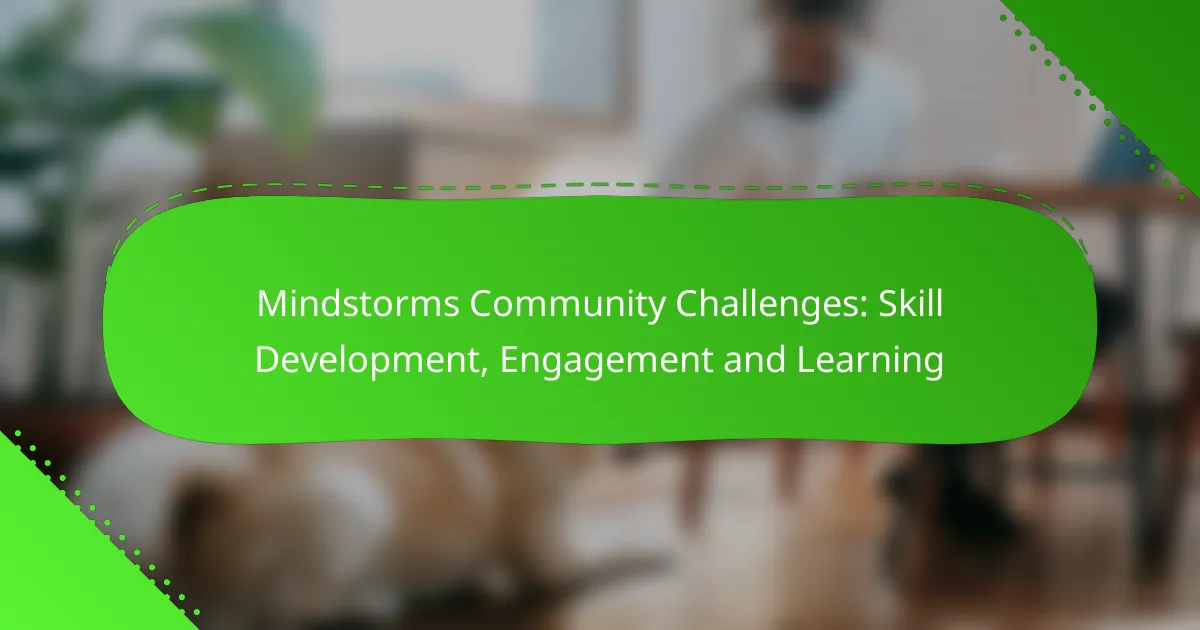Mindstorms Community Challenges are designed to enhance skill development through engaging, hands-on experiences in robotics and engineering. By fostering collaboration, creativity, and critical thinking, these challenges provide participants with valuable opportunities to learn and grow in technology-driven fields.

How do Mindstorms Community Challenges enhance skill development?
Mindstorms Community Challenges enhance skill development by providing participants with practical, hands-on experiences that foster learning in robotics and engineering. These challenges encourage engagement through collaboration, creativity, and critical thinking, essential skills for success in technology-driven fields.
Hands-on robotics experience
Participating in Mindstorms Community Challenges allows individuals to gain direct experience with robotics. This practical engagement helps solidify theoretical knowledge by applying concepts in real-world scenarios, such as programming robots to complete specific tasks.
For example, participants might build a robot to navigate a maze, which requires understanding sensors and motors. This type of hands-on experience is invaluable for developing technical skills and confidence in using robotics tools.
Collaboration with peers
Collaboration is a key component of Mindstorms Community Challenges, as participants often work in teams to tackle complex problems. This teamwork fosters communication skills and encourages the sharing of diverse ideas and approaches.
Working with peers can also lead to improved problem-solving, as team members can brainstorm solutions and learn from each other’s strengths. Engaging in group discussions and collaborative projects enhances the overall learning experience.
Problem-solving skills
Mindstorms Community Challenges are designed to present participants with various problems that require innovative solutions. This environment cultivates critical thinking and analytical skills, as individuals must assess challenges and devise effective strategies to overcome them.
For instance, participants may encounter obstacles during a challenge that require them to troubleshoot their robots or rethink their approach. This iterative process of testing and refining solutions is crucial for developing resilience and adaptability in problem-solving.
Creativity in design
Creativity plays a significant role in Mindstorms Community Challenges, as participants are encouraged to design unique robots that meet specific criteria. This freedom to innovate allows individuals to express their ideas and explore different design methodologies.
For example, participants might experiment with various materials and configurations to enhance their robot’s performance. This creative exploration not only makes the learning process enjoyable but also fosters a mindset geared towards innovation and design thinking.
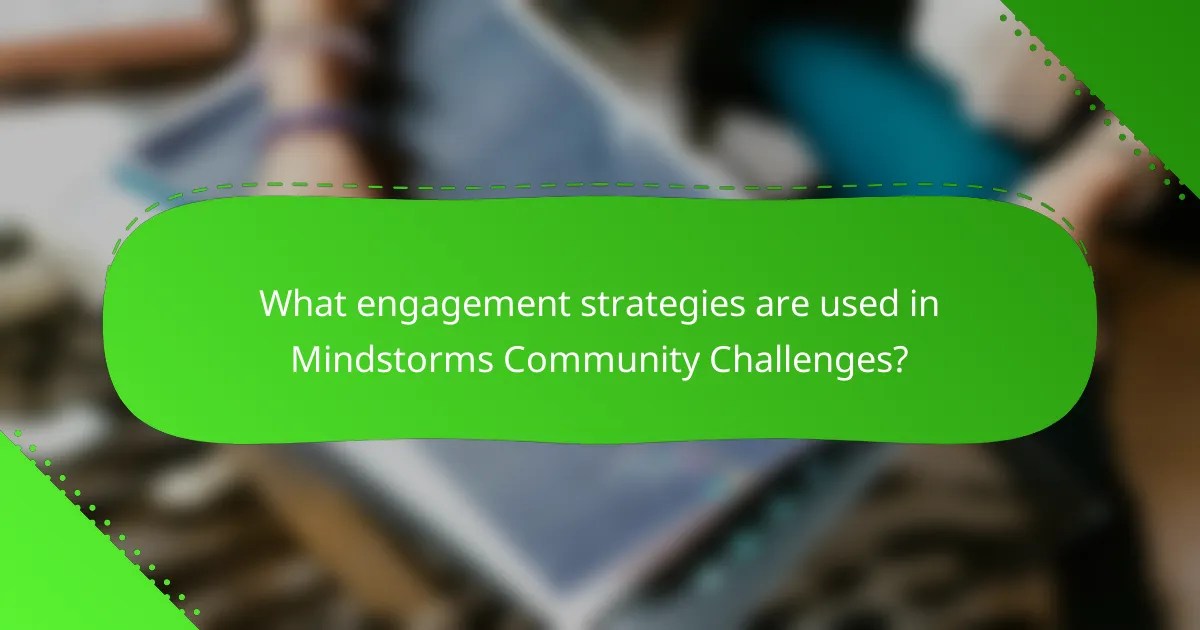
What engagement strategies are used in Mindstorms Community Challenges?
Mindstorms Community Challenges utilize various engagement strategies to enhance skill development and foster learning among participants. These strategies include interactive workshops, online forums, live competitions, and mentorship programs, each designed to promote collaboration and practical experience.
Interactive workshops
Interactive workshops are hands-on sessions where participants can learn directly from experts and peers. These workshops often focus on specific skills or projects, allowing attendees to apply concepts in real-time. For example, a workshop might guide participants through building a robot, emphasizing teamwork and problem-solving.
To maximize engagement, workshops should be kept small, ideally with no more than 15-20 participants. This ensures that everyone has the opportunity to ask questions and receive personalized feedback.
Online forums and discussions
Online forums and discussions provide a platform for participants to share ideas, ask questions, and collaborate on projects. These digital spaces can facilitate ongoing conversations about challenges and solutions, fostering a sense of community among members. Popular platforms include dedicated websites and social media groups.
To encourage participation, moderators should regularly post prompts and questions, and members should be encouraged to share their progress and insights. Active engagement in these forums can lead to valuable networking opportunities and knowledge sharing.
Live competitions
Live competitions are exciting events where participants showcase their skills and creativity in real-time challenges. These competitions can range from local meetups to larger international events, providing a platform for individuals and teams to demonstrate their projects. Prizes and recognition can motivate participants to perform at their best.
To prepare for competitions, participants should practice their builds and strategies in advance. Setting up mock competitions can help teams refine their approaches and build confidence before the actual event.
Mentorship programs
Mentorship programs connect experienced individuals with newcomers, providing guidance and support throughout the learning process. These relationships can help mentees gain insights into best practices, troubleshooting techniques, and project management skills. Mentors can also offer encouragement and motivation, which is crucial for skill development.
To establish effective mentorship, programs should match mentors and mentees based on shared interests and goals. Regular check-ins and feedback sessions can enhance the learning experience and ensure that both parties benefit from the relationship.
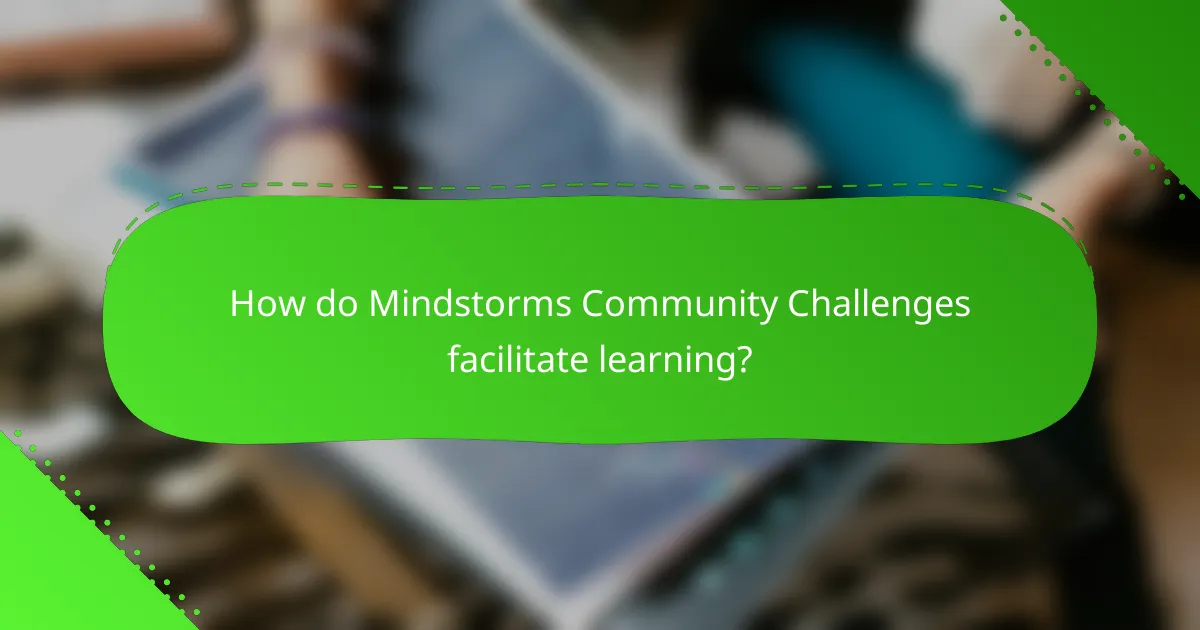
How do Mindstorms Community Challenges facilitate learning?
Mindstorms Community Challenges enhance learning by providing structured opportunities for participants to engage in hands-on projects that develop their skills. These challenges encourage collaboration, creativity, and critical thinking, making the learning process both effective and enjoyable.
Structured learning paths
Structured learning paths in Mindstorms Community Challenges guide participants through a series of progressively challenging tasks. This approach helps learners build foundational skills before tackling more complex problems, ensuring a solid understanding of robotics concepts.
For example, a beginner might start with basic programming tasks, while advanced users could work on integrating sensors and advanced algorithms. This tiered structure allows participants to learn at their own pace while still being part of a community.
Access to educational resources
Participants in Mindstorms Community Challenges gain access to a wealth of educational resources, including tutorials, videos, and forums. These materials are designed to support various learning styles and provide comprehensive guidance on robotics and programming.
Resources are often curated by experienced community members and can include project ideas, troubleshooting tips, and best practices. This access ensures that learners have the tools they need to succeed and encourages continuous improvement.
Feedback from experts
Feedback from experts is a crucial component of Mindstorms Community Challenges, as it helps participants refine their skills and approaches. Experienced mentors and peers provide constructive criticism and suggestions, fostering a supportive learning environment.
Receiving timely feedback allows participants to identify areas for improvement and encourages them to iterate on their projects. This interaction not only enhances the learning experience but also builds confidence in their abilities.
Real-world applications
Mindstorms Community Challenges emphasize real-world applications of robotics and programming skills. Participants often work on projects that mirror industry challenges, allowing them to see the relevance of their learning in practical contexts.
For instance, a challenge might involve designing a robot to solve a specific problem, such as automating a task or navigating a course. This hands-on experience prepares participants for future careers in technology and engineering fields, making their learning journey more meaningful.
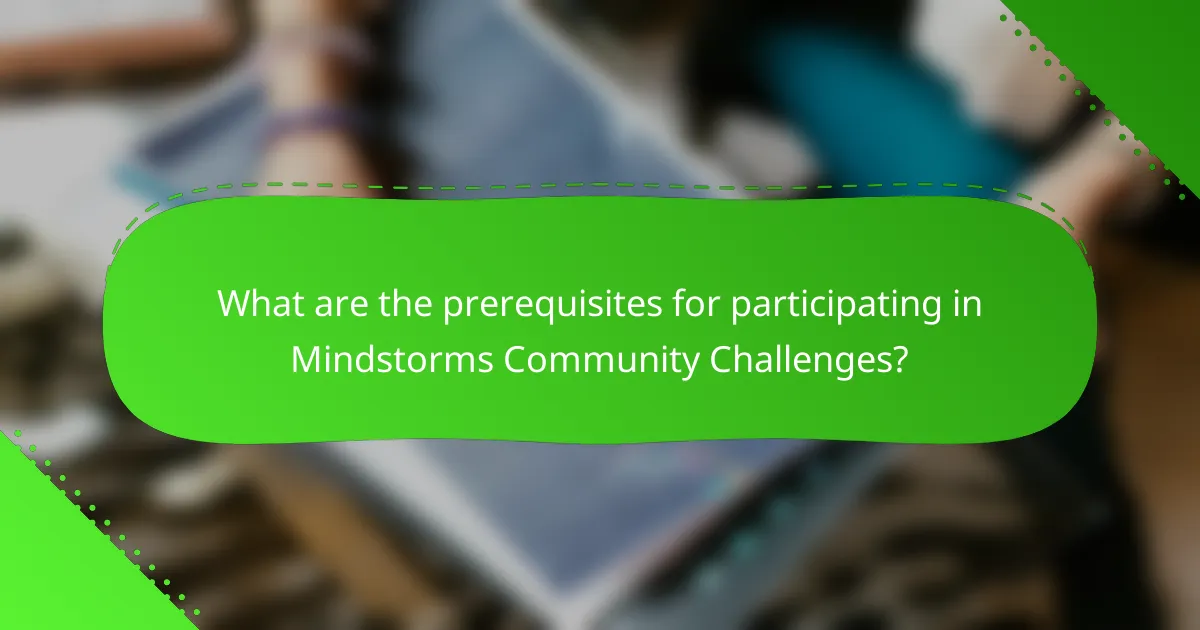
What are the prerequisites for participating in Mindstorms Community Challenges?
To participate in Mindstorms Community Challenges, individuals should have a foundational understanding of robotics, programming skills, and access to LEGO Mindstorms kits. These prerequisites ensure that participants can effectively engage with the challenges and maximize their learning experience.
Basic robotics knowledge
Basic robotics knowledge is essential for understanding how to build and operate robots using LEGO Mindstorms. Participants should be familiar with concepts such as sensors, motors, and basic mechanical design. This foundational knowledge allows individuals to troubleshoot issues and optimize their robot designs.
Consider reviewing key robotics principles, such as the functions of different sensors and how they interact with motors. Engaging with online resources or introductory robotics courses can enhance this knowledge, making it easier to tackle the challenges presented.
Familiarity with programming
Familiarity with programming is crucial for participants to effectively control their robots. Basic programming skills, particularly in languages like Python or the graphical programming interface used by LEGO Mindstorms, are beneficial. Understanding how to write simple algorithms will enable participants to create more complex behaviors for their robots.
To improve programming skills, consider practicing with sample projects or tutorials available online. Focus on learning how to implement loops, conditionals, and functions, as these are fundamental to robot programming.
Access to LEGO Mindstorms kits
Access to LEGO Mindstorms kits is a practical requirement for participating in the challenges. These kits provide the necessary components, including bricks, sensors, and motors, to build functional robots. Ensure that you have a complete kit or access to one to fully engage with the challenges.
If purchasing a kit is not feasible, consider collaborating with local schools, robotics clubs, or community centers that may have kits available for use. This collaboration can also enhance the learning experience through shared knowledge and teamwork.
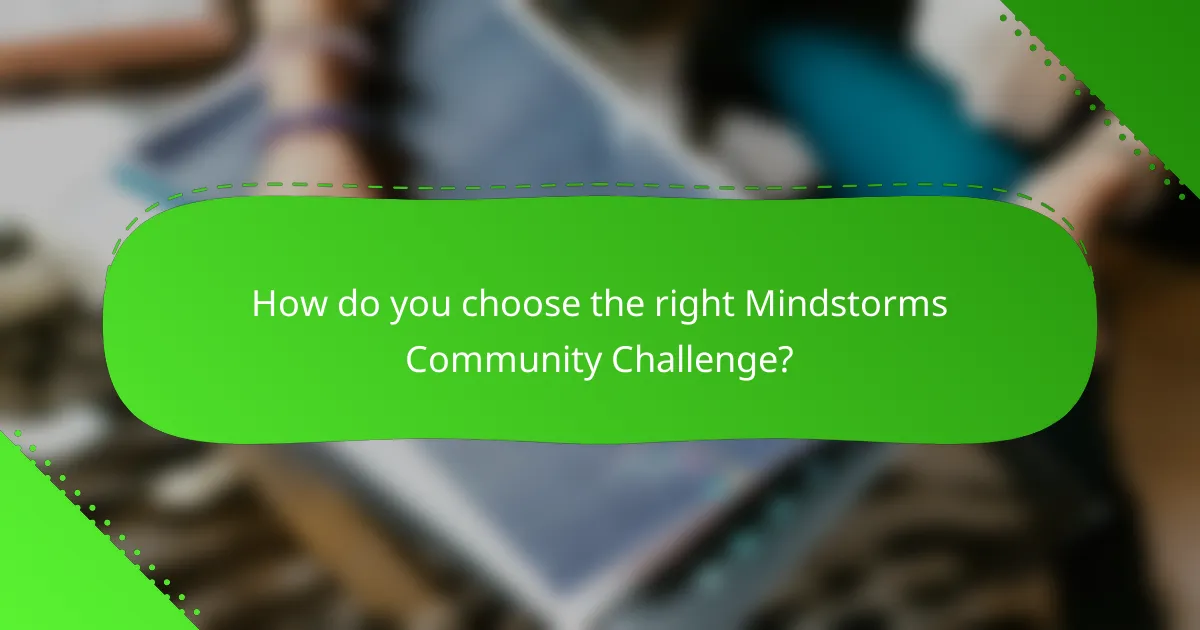
How do you choose the right Mindstorms Community Challenge?
Choosing the right Mindstorms Community Challenge involves assessing your skills, interests, and the support available. Consider your current proficiency with robotics and programming, the challenge themes that resonate with you, and the level of community assistance you can access.
Skill level alignment
Aligning the challenge with your skill level is crucial for a rewarding experience. Beginners should look for challenges that offer clear instructions and foundational concepts, while more advanced users can seek out complex problems that push their limits. Assess your comfort with programming languages like Python or Java and hardware components to find a suitable match.
To gauge your skill level, consider participating in introductory workshops or reviewing past challenges. This will help you identify where you stand and what challenges might be appropriate.
Challenge themes and objectives
Each Mindstorms Community Challenge has specific themes and objectives that guide participants. Themes can range from environmental sustainability to robotics in healthcare, providing diverse opportunities for engagement. Choose a theme that not only interests you but also aligns with your personal or professional goals.
Review the objectives of each challenge to ensure they resonate with your aspirations. For example, if you’re passionate about coding, select a challenge that emphasizes programming skills, while those interested in design might prefer challenges focused on building and aesthetics.
Community support availability
Community support can significantly enhance your challenge experience. Look for challenges with active forums, mentorship programs, or local meetups where you can seek help and share ideas. Engaging with a community can provide valuable insights and encouragement throughout the challenge.
Before committing, explore online platforms or social media groups related to the challenge. A vibrant community can make a difference, especially when facing obstacles or needing feedback on your project.
